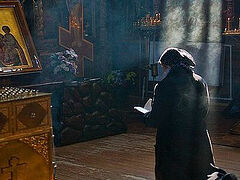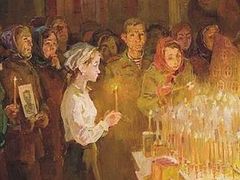We heard in Cheesefare week that, the Fast bears witness to the eternal truth of salvation, Christ. The Greek word used here for witness is μαρτυρία, otherwise translated as martyrdom. Consequently, the Fast is a martyrdom. We not only put to death the old man; within the Fast we bear witness before God and the host of Heaven, and before mankind on Earth as well, to the lifesaving spirit which variegates Great Lent. This is the second day of the Fast; last night we listened to the Great Canon of St. Andrew of Crete read during Great Compline. At Matins today we were advised to consider all those who have repented in the past. We heard many feats of repentance narrated throughout the Great Canon. David the Prophet King is an iconic image of repentance, the center point of today’s reflection.
Great Compline might have in its roots a monastic service; and, according to some perhaps it is not best suited for the context of a modern, twenty-first century Christian family consumed with the complexities of day to day living. However, the basis of Great Compline is the psalms—and who do we meet in the psalms? We meet Him Who is the cornerstone of our salvation, the First Martyr, the Living Witness, the Faithful Friend, the Eternal Son, Jesus Christ our Lord and Savior. David the Prophet King, the author of the Psalms, this icon of repentance who wept bitterly for the sin of adultery and murder—with a contrite and upright spirit prophesied of Christ and spoke of His coming into the world, His Holy Passion and Crucifixion and His Burial and His Descent into Hades and His Resurrection. In short, did not David exhibit the themes of Lent through his Psalter? And if we wish to enrich the Lenten days, would we not use the Psalms as our rudder? Throughout the Lenten weeks the reading of the Psalter in church is increased. Throughout the rest of the year if the Psalter is read once a week in church, in even portions named Kathismata, during Great Lent it is read twice weekly throughout the divine services.
It would be unreasonable to expect a family in today’s context to be present in church for the entire roster of Lenten services. Indeed, today, this is not even executed by many clerical families due to the lack of resources and various obligations. But the reading of Great Compline as a nightly, family activity is not an unattainable goal. It would take thirty minutes maximum to read and perhaps in certain portions abbreviations could be made according to everyone’s particular circumstances. The reading of the psalms and the singing of the hymns found in Great Compline should be a nightly Lenten family affair. Divided into various portions, the readings and hymns should be shared for everyone to participate, and the hymn, Lord of Hosts, chanted at the end can be chanted communally.
This will initiate our family into the intimate, prayerful spirit of the Great Fast. The psalms appointed for Great Compline are a dialogue of the soul with God amidst the sea of temptation and passions. They speak of deliverance and salvation, the redemption offered by Christ to those who sincerely struggle to obtain the eternal reward. They proclaim that through the sea of the world, God is with us, know you nations and understand, for God is with us. Though today Christians may be facing a persecution and onslaught of a moral nature—for example, in the West the neglect of the family if not the outright denial and rejection of the family unit—still, the Lord’s providence is what governs the world, and He Himself many-a-times through history has brought about events towards His purposes and the furthering of His Kingdom. There will always be those few in the world who in sincerity seek Him and strive to execute His holy and unfathomable will. Despite the various situations which plague us, literally and metaphorically, should we not confess that the Son given unto us has the Dominion on His shoulders?
So, let us gather in the silence of the Lenten evenings in front of our icon corner with the gentle oil lamp flickering, and there let us seek Christ the enteral Bridegroom whom we meet in hymns. Praying fervently, let us beseech Him in the stillness of the Lenten evenings to deliver us from the spirit of idleness, curiosity, avarice, and self-love—the root of all evil. Then, He will reign in our homes and towns and nations and world as Lord and King and Master of our lives. His purpose, the endowment of the resurrection on mankind, some to life and others to judgment, is unavoidable. It is a fearful thing to fall into the hands of the living God. Let us live each Lenten hour with this consciously in mind, so we may be vouchsafed the portion of the wise virgins, the portion of the faithful steward, the portion of the loyal servants who will hear His beloved voice say on that final day, inherit ye loyal servants of my Father the Kingdom prepared for you before the world’s foundation.




